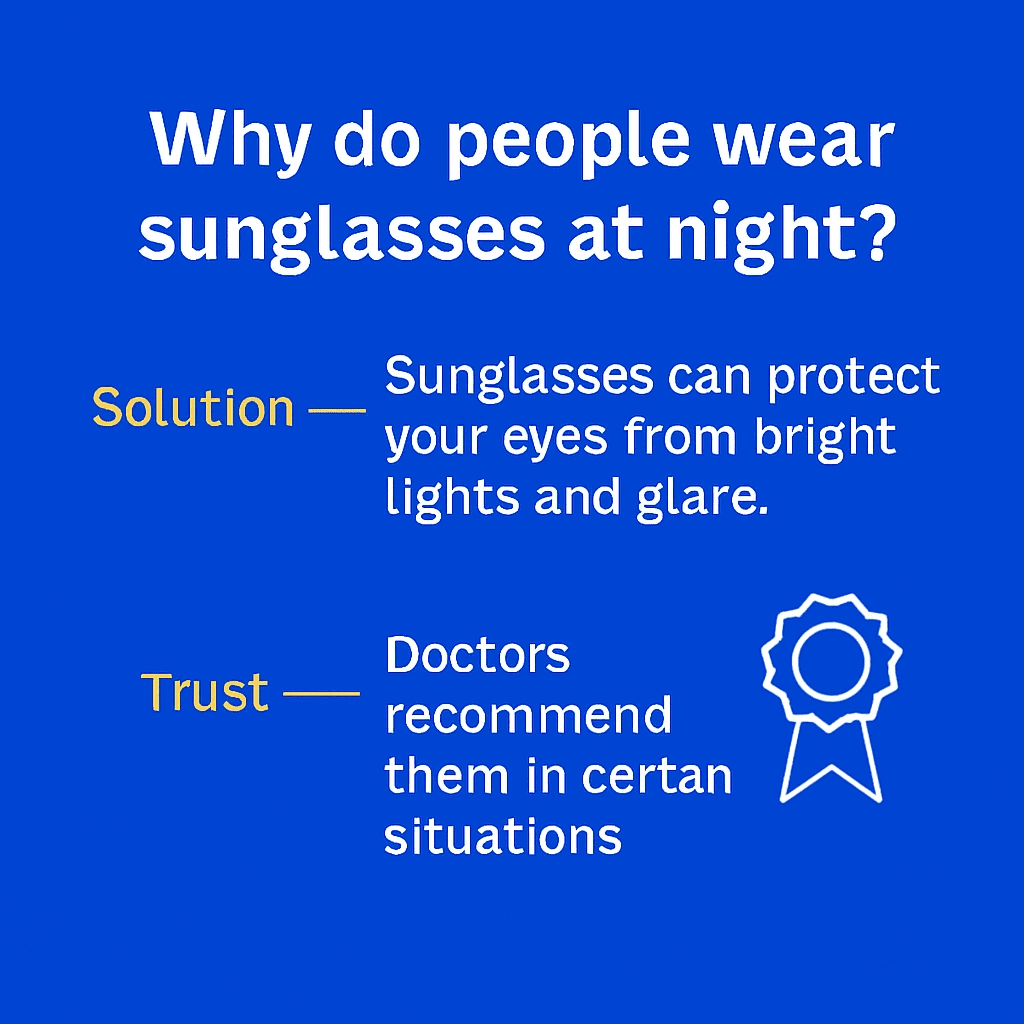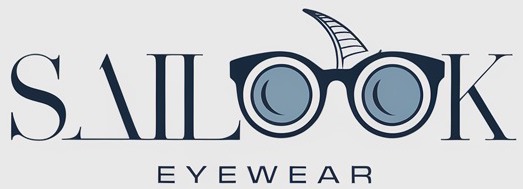Wearing sunglasses at night may seem strange at first, but for some, it’s a practical choice. Whether due to medical conditions, fashion preferences, or concerns over driving at night, there are several reasons people might reach for a pair of shades when the sun isn’t out. This article will break down the reasons behind this unusual trend, exploring both the benefits and the misconceptions. By understanding the purpose and appropriate use of night sunglasses, you can make an informed decision about when and why they may be a helpful tool.

1. Why Do People Wear Sunglasses at Night?
Wearing sunglasses at night is not as common as in daylight, but it has gained some popularity. What’s the real story? In some cases, it’s not about vanity but about addressing specific needs. For instance, those with certain eye conditions may wear sunglasses at night to manage light sensitivity or discomfort. Others may use them to reduce glare, especially while driving. Sunglasses at night can block artificial light, which can help alleviate some symptoms caused by photophobia or sensitivity to headlights and streetlights. People who have had eye surgery, like cataract operations, may also wear sunglasses to protect their eyes from bright lights. But here’s the kicker – it’s also a style statement for some, with celebrities and influencers frequently wearing sunglasses indoors or during evening events.
| Reason for Wearing Sunglasses at Night | Explanation |
|---|---|
| Light Sensitivity (Photophobia) | Reduces discomfort caused by artificial lighting |
| Protection Post-Surgery | Essential for individuals recovering from surgeries like cataract operations |
| Fashion Statement | Sunglasses as part of a modern trend, popular among celebrities |
| Glare Reduction | Reduces glare from headlights and streetlights during night driving |
2. What Are the Benefits of Wearing Sunglasses at Night?
Wearing sunglasses at night is not just a fashion trend but also has several practical benefits. Ready for the good part? People suffering from conditions like photophobia, where their eyes are overly sensitive to light, may find wearing sunglasses indoors or at night essential to managing discomfort. This is where it gets interesting – sunglasses with specific lens colors, such as yellow or amber, can improve contrast and clarity in low-light situations, like nighttime driving. By filtering out blue light, which can cause glare from streetlights and headlights, these lenses can provide a more comfortable visual experience. People who spend long hours on the road at night may find these sunglasses particularly useful. What’s the real story? Sunglasses can also help reduce eye strain and fatigue caused by harsh artificial lights.
| Benefit of Wearing Sunglasses at Night | Explanation |
|---|---|
| Reduced Glare from Lights | Helps in reducing discomfort from artificial light sources |
| Improved Visual Comfort | Enhances contrast, making it easier to see in low-light conditions |
| Reduced Eye Fatigue | Provides comfort and relief when exposed to prolonged light sources |
3. Are There Any Health Reasons for Wearing Sunglasses at Night?
Health conditions that make people more sensitive to light often lead them to wear sunglasses at night. This is where it gets interesting – individuals with migraines may wear glasses with yellow or amber lenses to reduce light sensitivity and prevent headaches. But here’s the kicker – people recovering from eye surgeries like cataract surgery may also need sunglasses at night as their eyes are more sensitive to bright lights. For those with light sensitivity issues, sunglasses offer a simple and effective solution to managing discomfort. Here’s the deal – even for those without specific medical conditions, sunglasses can provide protection from harsh light sources, reducing the risk of eye strain and enhancing comfort.
| Health Condition | How Sunglasses Help |
|---|---|
| Migraines | Reduces light sensitivity and prevents headaches |
| Cataracts and Glaucoma | Protects the eyes from bright lights during recovery |
| Post-Surgery Recovery | Minimizes discomfort caused by bright or artificial light |
4. Can Sunglasses Improve Night Driving?
When driving at night, headlights and streetlights can create a glare that makes it difficult to see. What’s the real story? Wearing sunglasses can dramatically reduce this glare. The key is to choose the right type of sunglasses. Night driving sunglasses typically have lenses designed to reduce blue light and enhance contrast, making it easier to distinguish objects in the dark. Ready for the good part? Polarized lenses are particularly effective at filtering out the horizontal light that causes glare. A good pair of night-driving sunglasses can make a noticeable difference in reducing eye fatigue and improving safety on the road. But here’s the kicker – some lenses, like yellow or amber tints, can also enhance clarity by increasing contrast during low-light conditions, helping drivers see more clearly.
| Best Sunglasses for Night Driving | Features |
|---|---|
| Polarized Lenses | Reduces glare from headlights and streetlights |
| Yellow or Amber Lenses | Enhances contrast and improves visibility in low-light conditions |
| Anti-Glare Coatings | Helps reduce glare caused by artificial light sources |
5. What Types of Sunglasses Are Recommended for Night Use?
Not all sunglasses are created equal, especially when it comes to wearing them at night. What’s the real story? Polarized lenses are often recommended for night driving as they reduce glare and enhance contrast. But here’s the kicker – yellow or amber lenses are particularly beneficial for improving contrast and visual clarity in low-light conditions. These lenses help increase depth perception and allow for clearer vision, which is especially helpful while driving at night. This is where it gets interesting – some night-use sunglasses also feature anti-glare coatings that further reduce light sensitivity. Popular brands have created specialized sunglasses for these purposes, with options specifically designed for both comfort and safety.
| Recommended Sunglasses for Night Use | Features |
|---|---|
| Polarized Lenses | Reduces glare and enhances contrast in low-light conditions |
| Yellow or Amber Lenses | Improves contrast and visual clarity during night driving |
| Anti-Glare Coatings | Further reduces glare from artificial light |
6. Is It Fashionable to Wear Sunglasses at Night?
While sunglasses at night may have once been seen as a fashion faux pas, they have become a statement piece in modern style. What’s the real story? Celebrities and influencers are often seen wearing sunglasses at night or indoors, making it a trend embraced by many fashion-forward individuals. Ready for the good part? Sunglasses add an element of mystery and intrigue to one’s outfit, creating an air of sophistication or rebellion, depending on the context. But here’s the kicker – some designers and fashion houses have incorporated sunglasses into their evening wear collections, making them a staple in high-fashion events. This is where it gets interesting – for those who are more conservative about fashion trends, wearing sunglasses at night can be a way to channel celebrity-inspired looks without being overly flashy.
| Fashion Use of Sunglasses at Night | Explanation |
|---|---|
| Celebrities Wearing Sunglasses Indoors | A trendy style, often used by influential figures |
| Sunglasses as Part of Evening Wear | High-fashion collections include sunglasses for night use |
| Personal Fashion Statement | Sunglasses provide a sense of mystery and sophistication |
7. When Did People Start Wearing Sunglasses at Night?
The concept of wearing sunglasses at night has evolved over time. What’s the real story? It began in the mid-20th century when movie stars like James Dean and Audrey Hepburn began wearing sunglasses as a way to maintain a certain mystique and allure. Here’s the deal – the trend quickly spread to the public, and sunglasses became associated with glamour, not just eye protection. But here’s the kicker – today, sunglasses are worn not only to protect the eyes but also to make a statement about personal style. Whether at a red carpet event or a casual night out, sunglasses have become part of modern fashion. This is where it gets interesting – over the years, sunglasses have taken on new meanings, from being functional to being purely aesthetic.
| History of Wearing Sunglasses at Night | Key Moments in Fashion History |
|---|---|
| James Dean & Audrey Hepburn | Popularized the mystique of sunglasses indoors |
| 1980s and Beyond | Celebrities and fashion houses embrace night-time sunglasses |
| Sunglasses as Part of Everyday Fashion | Sunglasses move from functionality to aesthetic use |
8. Can Wearing Sunglasses at Night Be Dangerous?
While sunglasses at night offer comfort for many, they can also present some risks if used incorrectly. What’s the real story? Wearing sunglasses in poorly lit environments can reduce visual clarity, making it harder to adjust to darker surroundings. But here’s the kicker – this could be especially dangerous when driving, as it may prevent drivers from seeing obstacles or road signs clearly. Ready for the good part? To avoid these risks, it’s essential to wear sunglasses designed for night use, such as those with light-tinted or anti-glare lenses, rather than dark sunglasses that could impair your vision. This is where it gets interesting – balance is key when using sunglasses at night. They should be worn only when necessary for glare reduction, not as a general accessory in all low-light conditions.
| Risks of Wearing Sunglasses at Night | Potential Consequences |
|---|---|
| Reduced Night Vision | Difficulty in adjusting to low-light environments |
| Driving Hazards | Impaired vision on the road due to dark lenses |
| Overuse of Sunglasses | Dependence on glasses may cause difficulty in natural vision adjustment |
9. Do Sunglasses Affect Night Vision?
Wearing sunglasses at night may affect how your eyes adapt to low-light conditions. What’s the real story? If the lenses are too dark, they can prevent your eyes from fully adjusting to the darkness, leading to temporary reduced night vision. But here’s the kicker – yellow, amber, or orange lenses actually help improve night vision by increasing contrast. Here’s the deal – if you need to wear sunglasses at night, it’s crucial to choose the right type of lenses that won’t hinder your ability to see clearly. Sunglasses with light tints designed for night use can help enhance your visibility rather than impair it.
| Types of Lenses for Night Vision | Effect on Night Vision |
|---|---|
| Yellow or Amber Lenses | Improve contrast and enhance visibility in the dark |
| Dark Lenses | Can hinder night vision and impair visual adjustment |
| Clear Lenses with Anti-Glare Coating | No impact on night vision, suitable for reducing glare |
10. How Can You Tell If You Need Sunglasses at Night?
Knowing when to wear sunglasses at night can be tricky, but there are signs that indicate their need. What’s the real story? If you experience discomfort or glare when driving at night or in well-lit indoor settings, sunglasses can be a useful tool. But here’s the kicker – if you find that bright lights cause you to squint or have headaches, it may be a sign that you’re sensitive to light. Ready for the good part? Sunglasses designed for night use can help alleviate these symptoms and improve your overall visual comfort. This is where it gets interesting – consulting with an eye care professional can help you determine if sunglasses are the right solution for your specific light sensitivity.
| Signs You May Need Sunglasses at Night | Symptoms |
|---|---|
| Light Sensitivity | Squinting, headaches, and discomfort from artificial light |
| Driving at Night | Glare from headlights causing visual strain |
| Post-Surgery Recovery | Protecting eyes from harsh light sources during healing |
11. How Do Sunglasses for Night Use Differ From Regular Sunglasses?
Sunglasses designed for night use differ significantly from regular sunglasses. What’s the real story? Night-use sunglasses typically have lenses with light tints, such as yellow, amber, or clear, that enhance contrast and reduce glare without darkening your surroundings too much. But here’s the kicker – regular sunglasses have dark lenses that are designed to protect from the sun’s UV rays, making them unsuitable for low-light conditions. This is where it gets interesting – night-use sunglasses may also come with polarized lenses to reduce glare, which regular sunglasses don’t always have.
| Night-Use Sunglasses vs Regular Sunglasses | Key Differences |
|---|---|
| Lenses for Night Use | Light tints (yellow, amber) for improved contrast |
| Regular Sunglasses | Dark lenses designed for UV protection |
| Polarized Lenses | Often included in night-use sunglasses to reduce glare |
12. Can Sunglasses Be Beneficial for People with Specific Eye Conditions?
For people with specific eye conditions, sunglasses at night can be more than a convenience—they can be essential. What’s the real story? Individuals suffering from cataracts, glaucoma, or other vision issues may find relief from wearing sunglasses that block harsh artificial lighting. Here’s the deal – people recovering from eye surgery may use sunglasses to protect their eyes from bright lights during the healing process. But here’s the kicker – using the right pair of sunglasses can help mitigate symptoms such as dry eyes or blurred vision, especially in low-light environments.
| Eye Condition | How Sunglasses Help |
|---|---|
| Cataracts | Protects eyes from harsh light sources during recovery |
| Glaucoma | Reduces discomfort from bright artificial lighting |
| Dry Eyes | Helps prevent irritation caused by dry air or artificial lights |
13. What Are the Best Sunglasses for Night Driving?
If you frequently drive at night, finding the right pair of sunglasses is crucial. What’s the real story? The best sunglasses for night driving should have lenses that reduce glare and increase contrast. Ready for the good part? Sunglasses with yellow or amber lenses are particularly effective for enhancing visibility and clarity in low-light conditions. But here’s the kicker – polarized lenses are an added benefit as they filter out horizontal light waves that cause glare. This is where it gets interesting – several brands offer specialized night-driving sunglasses designed to make nighttime driving safer and more comfortable.
| Best Sunglasses for Night Driving | Features |
|---|---|
| Yellow or Amber Lenses | Improve contrast and enhance visibility in low-light conditions |
| Polarized Lenses | Reduce glare caused by streetlights and headlights |
| Anti-Glare Coatings | Further reduce light sensitivity and glare for enhanced clarity |
14. How Do You Care for Night-Time Sunglasses?
To keep your night-time sunglasses in top condition, proper care is essential. What’s the real story? Cleaning your lenses regularly is key to maintaining optimal performance. Ready for the good part? Use a microfiber cloth to wipe away dirt and dust, avoiding abrasive materials that could scratch the lenses. But here’s the kicker – storing your sunglasses in a protective case can prevent damage and keep them in good shape for a longer time. This is where it gets interesting – always check the manufacturer’s instructions to ensure that you’re maintaining your lenses in the best possible way.
| Care Instructions for Night-Time Sunglasses | Tips for Maintenance |
|---|---|
| Cleaning the Lenses | Use microfiber cloth to avoid scratching |
| Storing Properly | Keep sunglasses in a protective case when not in use |
| Avoiding Harsh Cleaning Products | Stick to gentle cleaners designed for lenses |
15. Conclusion
In conclusion, wearing sunglasses at night is a practice that offers both practical and fashionable benefits. What’s the real story? Whether for reducing glare while driving, protecting sensitive eyes, or enhancing visibility in low-light conditions, sunglasses can play a key role in improving comfort and safety. But here’s the kicker – it’s important to choose the right pair of sunglasses specifically designed for night use, as the wrong lenses can impede your vision. Ready for the good part? Understanding when and how to use sunglasses at night will help you make the most of their benefits without compromising safety or eye health.
FAQ Section
Q1: What is the purpose of wearing sunglasses at night?
Wearing sunglasses at night helps reduce glare from artificial lights, making it easier for people with light sensitivity or those driving at night to see clearly and feel more comfortable.
Q2: How do sunglasses improve night driving?
Sunglasses reduce the glare caused by streetlights and headlights, helping to prevent discomfort and enhancing visibility during night driving.
Q3: Are night-driving sunglasses different from regular sunglasses?
Yes, night-driving sunglasses typically have yellow or amber lenses that increase contrast and reduce glare, unlike regular sunglasses which are designed to block UV rays during the day.
Q4: Can wearing sunglasses at night harm your eyes?
While sunglasses at night are beneficial for some, overuse in low-light conditions can hinder night vision, which may make it difficult to adjust to natural darkness.
Q5: What are the best lenses for wearing sunglasses at night?
Polarized lenses or yellow/amber tinted lenses are the best options for improving clarity and reducing glare at night, making it easier to see in low-light conditions.

